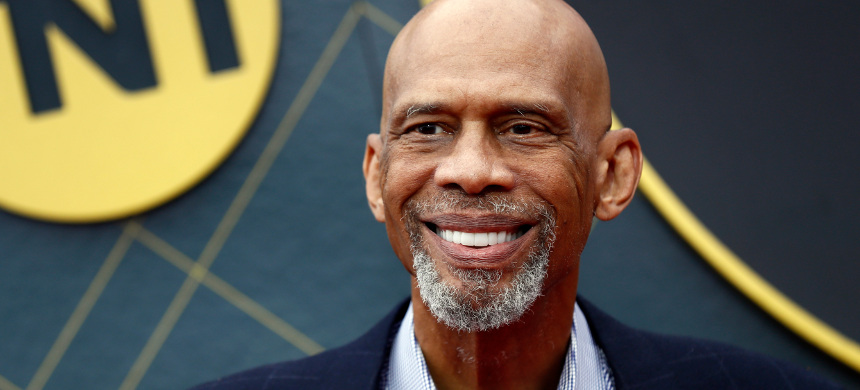
22 September 21
Live on the homepage now!
Reader Supported News
FIGHTING FOR RSN, AND DAMNED PROUD OF IT. This is one hell of a fight to keep Reader Supported News funded. We are surrounded by people who love to come here but hate to help support the organization. We can make RSN work, but it’s going to require a fight. Let’s make it a good one.
Marc Ash • Founder, Reader Supported News
Sure, I'll make a donation!

Bess Levin | Prosecutors Give Allen Weisselberg 3 Million New Reasons to Help Send Donald Trump to Prison
Bess Levin, Vanity Fair
Levin writes: "Fresh evidence has been uncovered that could change Weisselberg's tune about flipping."
Fresh evidence has been uncovered that could change Weisselberg’s tune about flipping.
Is Donald Trump going to live out his twilight years in prison? That‘s obviously a scenario that many people would love to see come to fruition, not just because of the immense damage he did to the country and democracy during his four years in office, but because of the fact that he’s spent his entire life escaping any and all consequences for being what legal experts call an “amoral sack of shit.” And while at the end of the day we can’t say for sure whether Trump will spend his final days in a prison cell, blathering away to his fellow inmates about how the 2020 election was stolen from him, or if he’ll simply make some unsuspecting Mar-a-Lago busboys listen to his rants about Joe Biden, windmills, and having to flush the toilet “10 [to] 15 times,” recent revelations suggest his outlook is not good.
The Daily Beast reports that a defense attorney for longtime Trump Organization chief financial officer Allen Weisselberg, who was charged in July with 15 felony counts including criminal tax fraud, grand larceny, falsifying business records, and scheming to defraud the government, revealed in court on Monday that prosecutors have discovered a “tranche of evidence in the basement of a coconspirator in the Trump Organization tax fraud case.” Though it’s not clear who the coconspirator is, two sources close to the investigation told The Daily Beast that “prosecutors have been more closely scrutinizing Matthew Calamari, a Trump bodyguard who rose through the ranks to become the company’s chief operating officer,” while others believe the individual in question may be Trump Organization controller Jeff McConney, who has been Weisselberg’s deputy for years and has already testified before the grand jury, according to the outlet. Equally significant? According to Weisselberg‘s lawyer, Bryan C. Skarlatos, the defense has “strong reason to believe there could be other indictments coming.” Obviously, those could be for any current or former Trump Organization employees, from Calamari to Trump’s three eldest children, to the ex-president himself. (“We remain in discussions with the district attorney’s office relating to Matthew Calamari Sr.,” Calamari’s lawyer, Nicholas Gravante, told Bloomberg on Monday. “But we continue to believe there is no basis for indicting him. If they presently intended to indict him, I would have been informed. I haven’t been and, in fact, have not been informed to the contrary.”)
Attorneys for Weisselberg—who, like the Trump Organization, has pleaded not guilty—brought up the new evidence while trying to get the presiding judge to push back an eventual trial date, arguing that they need more time to review what they said is more than 3 million documents, according to The Daily Beast. Prosecutor Solomon Shinerock took issue with Skarlatos’s complaint, noting that, as CFO of the company, the documents would be very familiar to Weisselberg. “They are almost exclusively and an overwhelmingly majority are Trump Organization records,” Shinerock said. “Mr. Weisselberg has been with the Trump Organization for 35 years and he’s the chief financial officer. And while he may not have technical access to certain of the records, as to the financial records, Mr. Weisselberg is the boss.” The judge set the next hearing in the case for January 22, 2022, and told lawyers to expect that a trial will likely begin in late August or early September 2022, Bloomberg noted.
Of course, if prosecutors have their way, there won’t be a trial, sources told The Daily Beast, as the Manhattan district attorney’s office is trying to convince Weisselberg to flip and cooperate against Trump. Some people, like former FBI agent Phil Andrew, believe that’s never going to happen, arguing that the longtime Trump Organization exec will stay loyal in the hopes of both remaining in Trump’s good graces and keeping his $940,000-a-year job. “He’s going to have to ride this in and demonstrate loyalty to end, because that’s his meal ticket,” Andrew told Bloomberg. Others have slightly different predictions:
Weisselberg may now be questioning whether continued loyalty will be rewarded, said John Moscow, a former senior white-collar prosecutor in the Manhattan district attorney’s office. Though still at the Trump Organization, Weisselberg was removed as CFO following the indictment, and he no longer serves as treasurer and secretary for many of the company’s subsidiaries.
“That’s a big change in his life, and if other people at the company are being told not to talk to him because they might be called to testify, that’s a change too,” said Moscow. “If I’m representing someone in that office, I would have to advise my client that someone like him may flip and may be wearing a wire.”
Former Trump lawyer and fixer Michael Cohen, who pleaded guilty to federal charges in 2018 and has since become one of his ex-boss’s fiercest critics, said loyalty is a one-way street for Trump.
“The notion that Donald Trump will take care of Allen or any member of the Weisselberg family is comical,” Cohen, who is serving the last remaining weeks of his three-year prison sentence in home confinement, told Bloomberg. “For him to go to prison, expecting that Donald or the company would reciprocate upon his release, and ensure that his family is financially secure, is pure fantasy. Allen, of all people, knows this better than anyone else.”
READ MORE
 Armored troops from the US Army National Guard return to their base after conducting a training mission, March 4, 2020. (photo: Lt. Col. Cindi King/US Army National Guard/Flickr)
Armored troops from the US Army National Guard return to their base after conducting a training mission, March 4, 2020. (photo: Lt. Col. Cindi King/US Army National Guard/Flickr)
You Can't Be Against "Forever Wars" Without Cutting the Military Budget
Luke Savage, Jacobin
Savage writes: "These days, a lot of politicians say they're against 'forever wars' - and that's a good thing. But the acid test for genuine opposition to the national security state is support for cutting the military budget."
These days, a lot of politicians say they’re against “forever wars” — and that’s a good thing. But the acid test for genuine opposition to the national security state is support for cutting the military budget.
In what’s ostensibly a uniquely polarized country, nothing is more bipartisan than lavish spending on the United States’ bloated military. Regardless of who controls Congress or which president occupies the White House, the Pentagon has become an insatiable maw into which the federal treasury is annually emptied.
On his new Substack Speaking Security, writer and researcher Stephen Semler has been meticulously tracking the corporate dollars and congressional votes that undergird the near-ironclad bipartisan consensus on increasing military spending in perpetuity.
Jacobin spoke to Semler about his work, the finer points of America’s ever-expanding military budget, and the deep corruption at its core.
LS: First, tell us a bit about Speaking Security. What’s its backstory, and what are you aiming to do with it?
SS: Initially, my purpose was to advise congressional primary challengers to Democratic incumbents by providing foreign policy advisory services. Because where else are they going to find actual foreign policy advice? I mean, Jacobin’s a good place to start if you ask me! But I’m talking mainly about real time, very quick, down-to-the-bones facts that they can deploy.
One way to do that is basically to follow the money. Which isn’t a new concept, obviously, but what I wanted the newsletter to do is provide it as a service to congressional progressives who are trying to take seats away from members who are standing in the way in one form or another — whether it be those in leadership positions or just entrenched incumbents with a lot of money.
Eventually, word got out about it, and now anyone can subscribe. So, I kind of changed it to be less tailored to primary and congressional candidates, and now it’s also for organizers and a general audience as well. To that end, I tend to publish material that’s very quick, digestible, and reader-friendly, because we all have a lot to read.
LS: The catalyst for your most recent Substack post was an amendment put forward by representatives Barbara Lee and Mark Pocan that aims to reduce Pentagon spending. Can you tell us a bit about what Lee and Pocan are trying to do? And what are the amendment’s prospects, as things stand?
SS: So, the amendment concerns this year’s NDAA (National Defense Authorization Act, the military policy bill). The military budget, as we know it, is sort of a two-step process in Congress. One is the authorizations, and one is the appropriations. The NDAA sets the top-line amount. It tells the DOD (Department of Defense) what it can and cannot do, but for the purposes of this conversation and the military budget, it generally sets the top-line amount and also says that DOD can spend no more than X on Y or no more than Y on Z. So, it effectively delimits the budget.
Joe Biden initially proposed a budget that was $12 billion higher than Donald Trump’s last year. Since then, two congressional committees — the House Armed Services Committee and the Senate Armed Services Committee — each added nearly $25 billion on top of it. So, we’re now $37 billion over last year in nominal terms. Military spending per year from Barack Obama’s last budget to Trump’s last budget increased $120 billion per year, so spending is incredibly high now.
Now, the amendment that Mark Pocan and Barbara Lee put forth is the same one that they did last year. It would take 10 percent of that $778 billion and just return it to the treasury. And it would apply to all funding accounts except for military personnel, the defense health program, and federal civilian employee pay — which is, you know, maximally considerate because, as we tear down empire, we want to be maximally considerate to the working class and working folks in general.
The amendment got ninety-three votes last year. Justin Amash from Michigan, who’s no longer in Congress, was the only sort of right-leaning member of Congress to vote for it. There are eighty-five members of that ninety-three still in Congress who ran for reelection, and all eighty-five are back in Congress. In other words, members who voted for it didn’t suffer electorally from it at all. So, that’s encouraging. But the goal for this year is to get new members on. And obviously, Jamaal Bowman replacing Eliot Engel is a step forward. Marie Newman’s in there. Cori Bush will be an assured vote, most definitely. But the basic story of Congress is that our best members are just too few in number. So, we have to figure out ways to help them punch above their weight on the issues they care about. And again: the American public is supportive of cutting the defense budget, for sure.
But there’s a class divide and an elite divide, too (which itself can mostly be explained by class). I don’t know if there’s ever been a study of what sort of media members of Congress consume. But, if you think about it, they receive Politico and the Hill every morning, both of which get funding from weapons manufacturers. During hearings and expert testimony, they call in representatives from think tanks who overwhelmingly take government or weapons manufacturer money. Among the top twenty companies as ranked by lobbying expenditures last year, five were weapons manufacturers. I think the strategy going forward is to highlight just how much different the overall congressional opinion is versus that of the general public. It’s very similar to what we saw recently with Afghanistan with the utter hysterics in the mainstream media, even as the public overwhelmingly backed withdrawal.
In any case, we just don’t have enough votes, and we have to accept that. We have to realize that we’re not going to win members over by politely talking them into it. The goal is just to win votes, and we have to distinguish between the members who are irreconcilable versus those who can be talked into it. And for the ones we can’t talk into it, we’re going to have to basically bully them and cultivate public support. Some members just have a bad policy outlook and aren’t bought off by the industry, which is ultimately an education problem.
We have to encourage the rank and file of Congress to break away from the leadership, which usually takes more money from weapons manufacturers. I really want to see the Squad use their star power to make the case that the NDAA process, the military budget process, is corruption in its purest form. A Brown University study that just came out found that a third to a half of Pentagon spending since September 11 went to private sector contracts. (In my own analysis, I found that 54 percent went to private sector contracts.)
These weapons manufacturers are deeply reliant on government contracts. In the case of Lockheed Martin, for example, 74 percent of their business came solely from government contracts last year. Over half the Pentagon budget goes to contracts, and around 30 percent goes to the top five weapons manufacturers. One basic definition of corruption is the use of public funds for private gains, and this is pretty much a textbook case.
I hope to help stigmatize campaign contributions, too, because, while there’s plenty of talk about Congress writing legislation that favors tax breaks to big donors and that kind of thing, Congress in this case is quite literally giving money to these corporations, and those corporations are giving it straight back. So, I hope not only to inform strategy in Congress but also influence the broader public by driving home the corruption at the core of all of this.
LS: Another recent post of yours runs through how House Republicans and Democrats voted on the last eight Pentagon budgets. What patterns did you identify here, and what would you say the prospects for a long-term reduction in the Pentagon budget look like — particularly given the recent withdrawal from Afghanistan?
SS: Well, it seems like Biden just reinvested his planned savings from Afghanistan back into the DOD budget, given his $12 billion increase in the president’s budget. Congress obviously has the same thing in mind given that they just upped it again (or at least the committees did) — by $25 billion. So, really, the plan of the establishment is to reinvest in empire, and, starting in 2018, there was purportedly a shift from an official end to the “war on terror” to what was called “great power competition.” This was established in a slew of documents, most notably the 2018 National Defense Strategy, which is mindless bullshit. On page five, it quite literally said that the surest way to prevent war is to prepare to win one. Which is obviously nonsense, because if country A spends more on their military, country B will perceive that as a threat and will spend more on its military to follow suit. The difference between being anti-war and being anti-imperialist consists in opposing these military budgets, because the budgets are what give empire life.
I think a big problem with Biden’s approach, which adopts the framework of great power competition, is that he’s treating the threat from non-democracies like China and Russia, which are now at the center of our national security strategy, as a bigger threat than climate change. Our strategy should be to create favorable conditions for the United States and China to come to a massive agreement on climate and lead the world towards a green transformation. That’s the sort of strategy we ought to see, and the link between the climate movement and the anti-imperialist movement can be one that centers on that.
Cribbing from the climate movement, we need to make the case for converting our war economy. The environmental movement has this notion of a just transition, and we should be talking about converting the war economy to a green one, because there’s tremendous talent and expertise — the manufacturing sector of the weapons industry has researchers, people who are experts. You’ve got a whole range of people who are in that sector because it’s the only job available. And I think we can create more opportunities by engaging unions and pushing for a broader transformation of the war economy into a green economy.
That starts with cutting the military budget.
READ MORE
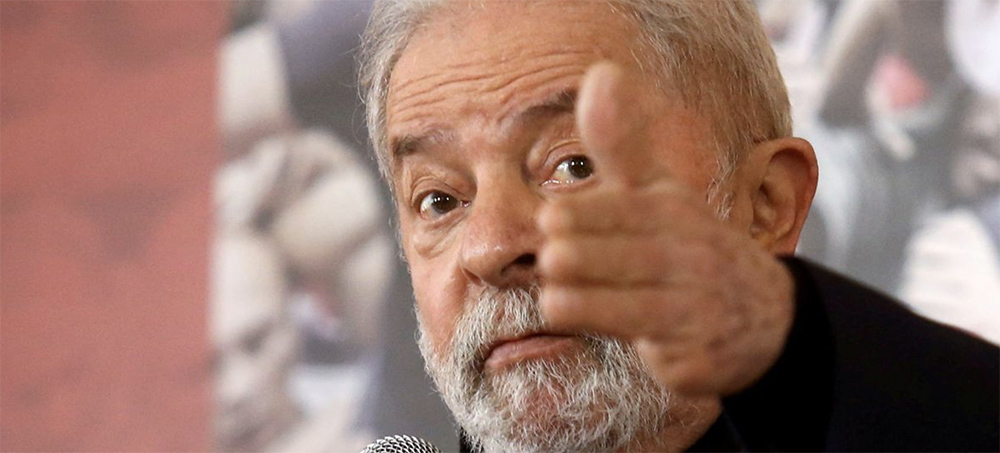 Former Brazilian president Luiz Inacio Lula da Silva gestures as he attends the release of the book "Why is Lula innocent and why they tried to destroy the greatest leader of Brazil"‚ in Sao Paulo, Brazil August 12, 2021. (photo: Carla Carniel/Reuters)
Former Brazilian president Luiz Inacio Lula da Silva gestures as he attends the release of the book "Why is Lula innocent and why they tried to destroy the greatest leader of Brazil"‚ in Sao Paulo, Brazil August 12, 2021. (photo: Carla Carniel/Reuters)
Lula Retains Solid Lead Over Bolsonaro for 2022 Brazil Race, Poll Shows
Reuters
Excerpt: "Brazil's leftist former President Luiz Inacio Lula da Silva remains ahead of far-right President Jair Bolsonaro by a significant margin in voter preferences for the 2022 elections, a survey by pollster Datafolha showed on Friday."
Brazil's leftist former President Luiz Inacio Lula da Silva remains ahead of far-right President Jair Bolsonaro by a significant margin in voter preferences for the 2022 elections, a survey by pollster Datafolha showed on Friday.
Voter support for Lula slipped to 44% from 46% in July, and Bolsonaro gained a percentage point to 26%, according to the poll, which asked voters to chose as if the election were now.
In a simulated runoff between the two, Lula would win 56% of votes versus 31% for the incumbent, compared to a 58%-31% advantage in the last poll. The variation since July fell within the poll's margin of error.
Other polls also show Lula's clear advantage as Bolsonaro's popularity slips due to rising inflation, high unemployment and his handling of the world's second-deadliest COVID-19 outbreak.
Neither candidate has officially announced his candidacy for the October 2022 election.
Datafolha said the survey showed rallies held by Bolsonaro on Sept. 7 to seek support in his clash with the Supreme Court have not modified the electoral outlook.
Centrist candidates have not gained traction either, disappointing parties angling for a third option to break up a polarized Lula-Bolsonaro race. Right-wing groups calling for a "Neither Lula Nor Bolsonaro" rally on Sept. 12 failed to draw much of a crowd in Sao Paulo.
Voter support for Ciro Gomes of the center-left Democratic Labor Party (PDT) and governors Joao Doria and Eduardo Leite, both of the center-right Brazilian Social Democratic Party (PSDB), remains in the single digits.
Bolsonaro's popularity has hit the lowest point since taking office in 2019, the Datafolha poll showed in data released on Thursday, with 53% of respondents disapproving of him compared to 51% in the previous survey in July. read more
His positive ratings fell to 22% from 24%, Datafolha said. The poll suggests Bolsonaro's attacks on the Supreme Court have not resonated with voters concerned about rising prices and a lack of work.
The Datafolha poll took place between Sept. 13-15, interviewing 3,667 people in person across Brazil, with a margin of error of two percentage points up or down.
READ MORE
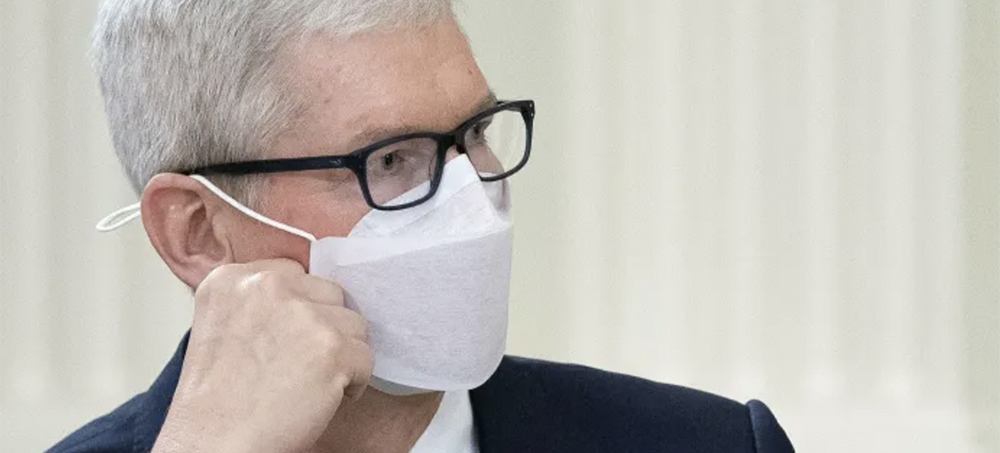 Tim Cook. (photo: Bloomberg)
Tim Cook. (photo: Bloomberg)
Do This Before iOS 15 Is Released to Stop Apple From Scanning Your Private Photos
Andy Meek, BGR
Meek writes: "Starting with iOS 15, Apple is going to start doing something new."
Coinciding with Tim Cook hitting the 10-year mark as Apple’s CEO, the iPhone maker has found itself in a strange place. The consumer electronics giant that’s spent years positioning itself as the pro-privacy alternative to tech giants like Google and Facebook has inadvertently landed smack in the middle of two things. One, a huge controversy that has normally pliant journalists treating Apple with rare skepticism. And, two, a controversy that also threatens to undermine Apple’s privacy-focused core philosophy under Cook. The culprit here: One of the many new iOS 15 features, included with the next big software update this fall. The company has also somewhat backtracked on this initiative, so let’s unpack all of it.
Controversial iOS 15 features
By now, if you follow Apple news to any degree, you’re probably familiar with the particulars. Starting with iOS 15, Apple is going to start doing something new. It will hash and compare photos destined to be uploaded to iCloud against a CSAM (child sexual abuse material) database. The National Center for Missing and Exploited Children, or NCMEC, maintains the database in the US. And the new iOS system kicks into action if the following conditions are met. First, if you possess specific CSAM material — which is already marked or hashed, and able to be matched against what’s in the NCMEC database. Also, if you use iCloud to store your photos, which the vast majority of iPhone owners do.
After you hit a threshold of successful comparisons of CSAM material — meaning, material that’s in your possession matches what’s in the database, a certain number of times — Apple notifies law enforcement.
Meanwhile, ironically, there’s actually a pretty easy way to avoid all this new scrutiny from Apple in the first place.
All you’ve got to do? Just disable the sharing of photos to iCloud.
Open the Settings app on your iPhone or iPad > then navigate to “Photos” > and disable the “iCloud Photos” option. After that, choose “Download Photos & Videos” when the popup appears, to pull everything in your iCloud Photos library down to your device.
The problem
If you then want to migrate away from Apple? Maybe, say, because you feel that the iPhone maker is invading your privacy via these new iOS 15 features? Well … all we can say is good luck with that transition. Almost every provider of cloud backup service already does this same kind of scanning. The key difference, and it’s a huge one, is that they do it all in the cloud. On their end.
Apple, however, performs both cloud scanning as well as some of the image matching on your device itself. And therein is the reason for the outcry from privacy advocates. Apple is going to be looking for a specific kind of contraband on your personal device going forward. Like it or not. Unless, that is, you disable the setting we noted above.
Snowden: Apple is protecting its brand
Speaking of which, NSA whistleblower Edward Snowden angrily blasted the fact that you can so easily do so in a new post he published to his Substack on Wednesday evening.
“If you’re an enterprising pedophile with a basement full of CSAM-tainted iPhones,” he writes, “Apple welcomes you to entirely exempt yourself from these scans by simply flipping the ‘Disable iCloud Photos’ switch.” It’s “a bypass which reveals that this system was never designed to protect children, as they would have you believe, but rather to protect their brand.”
In other words, he continues, this is about keeping that material off their servers. And thus keeping Apple out of negative headlines.
Do Snowden (and, for that matter, privacy advocates like him) seem overly concerned here about some dark hypothetical future because of these new iOS 15 features? Well, don’t forget: Apple in the past has used the hypothetical misuse of its products at some future date to pull back from implementing very understandable privacy actions in the here and now (here’s one example).
“So what happens when, in a few years at the latest … in order to protect the children, bills are passed in the legislature to prohibit this (Disable iCloud) bypass, effectively compelling Apple to scan photos that aren’t backed up to iCloud?” Snowden continues in his new post. Or, what about if a party in India starts demanding that Apple scan for memes associated with a separatist movement? “How long do we have left before the iPhone in your pocket begins quietly filing reports about encountering ‘extremist’ political material, or about your presence at a ‘civil disturbance’?”
Sure, they’re hypotheticals. They’re also squarely within the realm of the possible.
The response from Apple
Thus far, Apple’s response to the concerns of privacy advocates has been a thoroughly unsatisfying one. Essentially, it’s “just trust our safeguards.” This is from an Apple document the company published to try and allay concerns.
In response to people’s question about whether someone could repurpose Apple’s CSAM detection system to find things other than CSAM — like political material? Here’s Apple’s response. “Our process is designed to prevent that from happening.”
This is not, well, quite as explicit as stating that there is no way this could ever come to fruition. And as to whether governments could force Apple to scan for things other than CSAM?
“Apple would refuse such demands … We have faced demands to build and deploy government-mandated changes that degrade the privacy of users before, and have steadfastly refused those demands.”
READ MORE
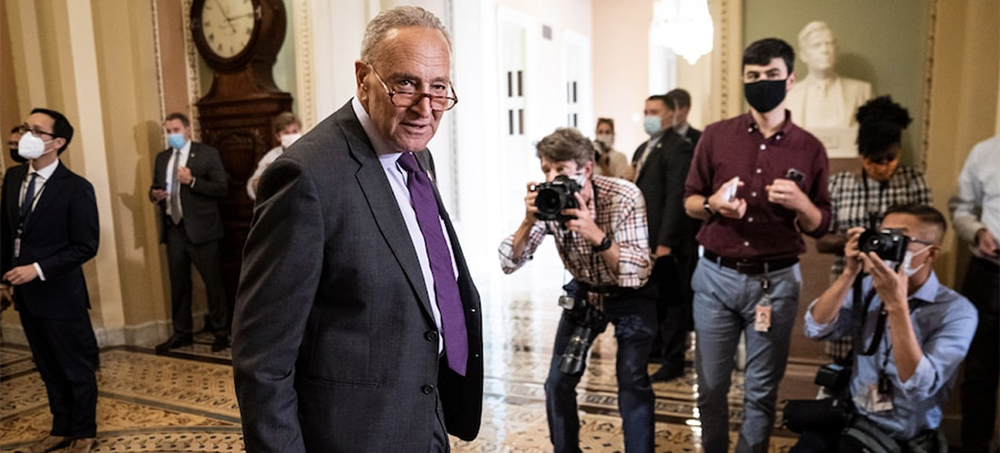 Senate Majority Leader Charles E. Schumer (D-N.Y.) called the parliamentarian's ruling, which barred certain immigration provisions from Democrats' spending package, 'extremely disappointing.' (photo: Jabin Botsford/WP)
Senate Majority Leader Charles E. Schumer (D-N.Y.) called the parliamentarian's ruling, which barred certain immigration provisions from Democrats' spending package, 'extremely disappointing.' (photo: Jabin Botsford/WP)
After Immigration Ruling, Democrats' Once-Sweeping Agenda Continues to Shrink
Mike DeBonis, Sean Sullivan and Maria Sacchetti, The Washington Post
Excerpt: "President Biden's governing agenda is at risk of unraveling on Capitol Hill after a mounting series of delays, clashes and setbacks that have sapped momentum from an ambitious and intricate push to deliver on long-standing Democratic policy priorities."
President Biden’s governing agenda is at risk of unraveling on Capitol Hill after a mounting series of delays, clashes and setbacks that have sapped momentum from an ambitious and intricate push to deliver on long-standing Democratic policy priorities.
An overhaul of the nation’s voting laws has been blocked by Republicans. An effort to strike a bipartisan deal on police reforms has lost all momentum. A sweeping immigration plan to provide a path to legal residency for millions of undocumented immigrants is now all but dead.
And centrist Democrats on Capitol Hill appear poised to pare down a planned $3.5 trillion economic package as their liberal counterparts in the House threaten in turn to kill the bipartisan infrastructure deal that passed the Senate last month.
Both chambers returned to session together Monday for the first time since July, as many Democrats acknowledged a sense of foreboding about the weeks ahead, with not only major aspects of their agenda on the line but also key deadlines looming to provide government funding and extend the federal debt limit.
“This is why we drew a very big circle at the outset, knowing that we might have our sails trimmed,” said Sen. Chris Murphy (D-Conn.). “This is all frustrating, because it’s clear that some really important things are going to be a lot harder.”
Murphy added that “there’s absolutely a pathway to get consensus on a set of things that fundamentally change people’s lives.”
But progress could depend on a new level of commitment and engagement from lawmakers and activists who have been more openly sparring with one another in recent weeks as obstacles have piled up.
The latest bad news came late Sunday from the Senate’s parliamentarian, who smacked down Democratic leaders’ attempts to insert sweeping immigration provisions into the party’s marquee “Build Back Better” legislation, ruling that the provisions did not qualify for special budget rules that could allow the bill to skirt a Republican filibuster.
To make the most of their razor-thin majority, Democrats are trying to pack as much as possible into a catchall bill that would expand health-care programs, grapple with climate change, extend the social safety net, lower prescription drug prices and pay for all of it by raising taxes on the wealthy. Unified Republican opposition to that sprawling agenda has eliminated any possibility of winning the 60 votes necessary to defeat a filibuster.
Senate rules allow for a simple majority to pass legislation under special budget procedures known as reconciliation, but those bills can include only provisions with a direct impact on federal revenue or spending. Proposals whose fiscal impact is “merely incidental” are not eligible for reconciliation — a test that the proposed immigration language did not meet, according to Parliamentarian Elizabeth MacDonough.
The proposals under consideration were vast, potentially granting legal residency to as many as 8 million immigrants, including the millions of “dreamers” — young undocumented immigrants who came to the United States as children and who have been the subject of years of negotiation and political wrangling, which have never culminated in a bipartisan agreement.
MacDonough, who was appointed under then-Majority Leader Harry M. Reid (D-Nev.) in 2012 and continued serving after Republicans took the majority in 2015, warned Democrats in her ruling that not every legislative proposal with a fiscal impact can be shoehorned into a reconciliation bill. The proposed immigration language, she wrote, represents a “tremendous and enduring policy change that dwarfs its budgetary impact.”
“The reasons that people risk their lives to come to this country — to escape religious and political persecution, famine, war, unspeakable violence and lack of opportunity in their home countries — cannot be measured in federal dollars,” she wrote in a memo to lawmakers.
That ruling vexed Senate Democrats, who had argued that several previous reconciliation bills included immigration provisions; Senate Majority Leader Charles E. Schumer (D-N.Y.) called the ruling “extremely disappointing.”
Republicans reveled in MacDonough’s decision.
“I’m glad Democrats failed in their effort to shove massive amnesty into the reckless taxing and spending spree they are assembling behind closed doors,” said Senate Minority Leader Mitch McConnell (R-Ky.). “This episode just shows how radical their far-left agenda has become.”
Furious liberal activists and immigrant advocates, many of whom called for MacDonough to be overruled or fired in light of the decision, are pushing Democrats not to give up.
Frank Sharry, the executive director of America’s Voice, a group promoting immigration changes, said the parliamentarian’s ruling amounted to a “middle finger” and “smacked of showboating.”
“If the parliamentarian is determined to get to no, then the question is, well, Democrats are the elected majority, and not a staff attorney — what do they plan to do?” he said.
Some of the hundreds who held a long-planned march Monday in Washington to call for a path to citizenship for millions of undocumented immigrants said they were devastated by the decision because they viewed Democrats’ combined control of the House, Senate and White House as a rare opportunity to secure gains after decades of marches, vigils and lobbying.
“It’s sad,” said Claudia Laínez, 43, who fled the aftermath of the civil war in El Salvador in 1994 and now is the mother of a U.S. citizen in Oakland, Calif. “It’s the only opportunity we have.”
Rep. Ayanna Pressley (D-Mass.) told the marchers — who are seeking a path to citizenship for holders of temporary protected status — that the Senate should disregard the parliamentarian and legalize millions of immigrants.
“This is about much more than process and procedures,” she said. “This is about real people.”
But key Democrats signaled Monday that they did not see procedural hardball as an option. Sen. Robert Menendez (D-N.J.), the most senior Latino member of the Senate, told reporters Monday that “I don’t think it’s necessarily constructive” to dismiss MacDonough, while Sen. Richard J. Durbin (D-Ill.), the No. 2 Senate leader, said Democrats simply did not have the votes to do it.
Several Democratic senators who disagreed with her ruling also said that any anger at MacDonough is misplaced, instead citing their colleagues’ unwillingness to change Senate rules to reform or eliminate the filibuster to pass legislation with a simple-majority vote.
“I think if we don’t face filibuster reform, and we don’t get a lot of these reforms done, there will be consequences in the election,” said Sen. Mazie Hirono (D-Hawaii).
The White House on Monday expressed hope that Democratic senators would find success in presenting fallback immigration proposals that could win the approval of the Senate parliamentarian and ultimately be included in the reconciliation package.
“There are a number of senators who have spoken to their intention of putting forward alternative proposals, because of their commitment, and our shared commitment, of course, to moving immigration reform forward and protecting dreamers and others,” said White House press secretary Jen Psaki.
MacDonough’s ruling marked the second time this year that she objected to including a major Democratic campaign priority in a reconciliation bill. Earlier, Democrats sought to add an increase in the federal minimum wage to a sweeping pandemic relief bill before being rebuffed.
She has not finished ruling on the pending legislation: Key decisions on climate and health-care provisions are still to come, and Democratic leaders said they are prepared to offer immigration alternatives for her review.
Beyond the minimum wage and immigration, talks have stalled over police reform, and lawmakers have shown little progress toward passing any new restrictions on guns, putting two other Democratic priorities at risk of falling by the wayside before voters head to the polls in 2022.
While Democrats have agreed among themselves on the need for federal voting rights legislation in the face of GOP efforts to tighten state restrictions, their proposal has not garnered any Republican support. A Senate vote on a revised bill could happen as soon as this week, but there is no expectation that the result will be any different from the one in June, when all 50 GOP senators opposed proceeding.
These developments have called into question how much of the program that Biden and his party ran on last year will actually be realized. Even amid signs that much of it could go unfulfilled, the White House sought to strike an optimistic note.
Asked Monday whether there is a recognition in the White House that some of the Democratic agenda is not going to happen, Psaki replied flatly, “No.”
One White House official, speaking on the condition of anonymity to describe private discussions, said the White House is seeking to tune out the noise and commentary about the agenda and stay focused on the work. Noting that others in party raised worries about the pandemic relief bill, which Biden signed into law, and the bipartisan infrastructure deal it reached in the Senate, the official said that not every development along the way is definitive.
White House officials in recent months have sought to underscore the steps they have taken unilaterally to address concerns in the party about voting rights and other issues, as Congress spins its wheels. But inside and outside the White House, there is acknowledgment that those steps are not nearly as robust as legislation would be.
Democratic pollster Fernand Amandi said there is an “existential urgency” to the party passing its agenda — and he warned that failing to do so could breed more of the anger at a broken government that fueled the rise of former president Donald Trump.
“This is more than a question about mere legislation — this is also a question about the very nature of America,” he said, adding, “The American voters did not give full control of the federal government and the legislative and executive branch so the Democrats could refer to the Senate parliamentarian.”
READ MORE
 Visitors are able to write personal messages to loved ones with Sharpies on the white flags on the National Mall. This flag has a dedication to Dominique Warren Stephenson, and reads: 'Hundreds of thousands of needless deaths because of incompetence. Thank God for President Joe Biden. May God Bless Us All.' (photo: National Geographic)
Visitors are able to write personal messages to loved ones with Sharpies on the white flags on the National Mall. This flag has a dedication to Dominique Warren Stephenson, and reads: 'Hundreds of thousands of needless deaths because of incompetence. Thank God for President Joe Biden. May God Bless Us All.' (photo: National Geographic)
COVID-19 Has Now Killed as Many Americans as the 1918-19 Flu Pandemic
Yasemin Saplakoglu, Live Science
Saplakoglu writes: "As of Tuesday, more than 676,200 people have died in the U.S. from COVID-19."
As of Tuesday (Sept. 21), more than 676,200 people have died in the U.S. from COVID-19.
COVID-19 has now killed as many people in the U.S. as the 1918 flu pandemic, which is often cited as the most severe pandemic in recent history, according to the Associated Press.
As of Tuesday (Sept. 21), more than 676,200 people have died in the U.S. from COVID-19, according to the Johns Hopkins dashboard. The 1918-1919 flu pandemic is thought to have killed roughly 675,000 people in the U.S., according to the Centers for Disease Control and Prevention (CDC).
But it's not exactly clear how many people died a century ago, due to incomplete records and poor understanding of the illness cause, according to the AP.
The worldwide mortality from COVID-19 — estimated at around 4.7 million deaths to date — is nowhere near global deaths brought by the 1918 flu, a number estimated to be more than 50 million.
Of course, an apples-to-apples comparison doesn't reveal the true picture of either pandemic, as there are many factors that have changed since a century ago.
On one hand, the population of the U.S. was about a third of what it is today, which means that the 1918 flu wiped out a bigger part of the population than the COVID-19 pandemic has so far, according to the AP. (And the population of the world was about a fourth of what it is today.)
On the other hand, there have been significant scientific advances since a century ago, including three currently available vaccines against COVID-19 in the U.S.
Not only were vaccines not available in 1918, but also they didn't have antibiotics to treat secondary bacterial infections at the time, according to the AP. The 1918 flu killed young, healthy adults in much bigger numbers than COVID-19, which has disproportionately targeted the older and more vulnerable population.
There are currently about 1,900 COVID-related deaths a day, on average in the U.S., and University of Washington projections suggest an additional 100,000 deaths related to the disease in the U.S. by Jan. 1, 2022, according to the AP.
About 64% of the eligible population in the U.S. (those 12 years of age or older) are now fully vaccinated against COVID-19.
Only about 43% of the world population has received at least one dose of a COVID-19 vaccine, with only 2% of people in low-income countries who received one dose, according to our World in Data. (The vaccines are still not readily available in many countries around the world.)
COVID-19 would have been much less deadly in the U.S., where vaccines are readily available, if more people had quickly gotten vaccinated. "We still have an opportunity to turn it around," Dr. Jeremy Brown, director of emergency care research at the National Institutes of Health, told the AP. "We often lose sight of how lucky we are to take these things for granted."
How the COVID-19 pandemic will be remembered in comparison to the 1918 flu remains unclear. You'd like to say it won't be remembered the worst in human history, .
"We have a lot more infection control, a lot more ability to support people who are sick. We have modern medicine," Ann Marie Kimball, a retired University of Washington professor of epidemiology, told the AP. "But we have a lot more people and a lot more mobility. ... The fear is eventually a new strain gets around a particular vaccine target."
READ MORE
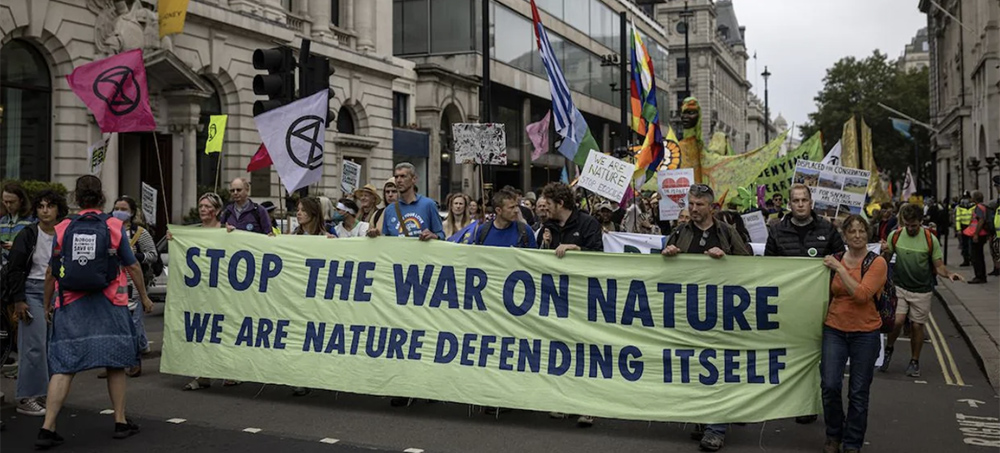 Extinction Rebellion protesters join the March for Nature on Sept. 4, 2021 in London, England. (photo: Rob Pinney/Getty Images)
Extinction Rebellion protesters join the March for Nature on Sept. 4, 2021 in London, England. (photo: Rob Pinney/Getty Images)
5 Issues to Watch at Climate Week 2021
Lorena Gonzalez and Nate Shelter, World Research Institute
Excerpt: "World leaders are gathering in New York this week and next for the UN General Assembly meeting and Climate Week. The two major events come at a critical moment for climate action."
World leaders are gathering in New York this week and next for the UN General Assembly meeting (UNGA76) and Climate Week. The two major events come at a critical moment for climate action.
The world is facing an emergency. Nearly every person on the planet felt the impacts of climate change this summer — from devastating flooding in China, Uganda, Nigeria, the United States and Western Europe; to extreme heatwaves and droughts across Africa and the Americas; to record wildfires in the United States, Canada, Russia and the Arctic; and heavy monsoon rains in India and the Philippines. The toll on people's lives and livelihoods keeps growing.
Meanwhile, the newest report from the Intergovernmental Panel on Climate Change (IPCC), the world's most authoritative scientific body on climate change, shows that these impacts are just the beginning. They will seem mild compared to what we will face if we do not act. The report finds that the world still has a narrow path to limit average global warming to 1.5 degrees C (2.7 degrees F) — the limit scientists say is necessary for avoiding the worst effects of climate change — but it will require rapid, transformational change this decade.
Governments and businesses — especially world's major emitters — must urgently step up their commitments to meet this challenge, and then rapidly move from commitments to action. Coming just six weeks before UN climate negotiations in Glasgow (COP26), where countries need to make major progress on climate action, UNGA and Climate Week are important opportunities for leaders to show their ambition on climate change.
Here are five critical areas we are watching for signs of progress:
1. Stronger National Climate Plans (NDCs)
UNGA presents a prime opportunity for major emitters to step up with more ambitious plans to reduce their emissions by 2030. This year, all countries are expected to submit updated national climate plans, known as Nationally Determined Contributions (NDCs), under the Paris Agreement. So far, 116 countries representing roughly half of global emissions have submitted updated plans. Yet only about half of these (67 countries), reflect higher ambition than their original plans submitted in 2015, and altogether these efforts are not nearly enough to limit global temperature increase to 1.5 degrees C.
Major emitters that have not yet announced new and more ambitious targets need to come forward by COP26 with serious offers to curb their emissions by 2030. At the G20 ministerial meeting in July, the G20 countries committed to submit new or updated NDCs by COP26. UNGA is a prime opportunity to come forward with those targets. A new paper by WRI and Climate Analytics finds that if all G20 countries set ambitious 2030 emissions-reduction targets and commit to reach net-zero emissions by mid-century, global temperature rise could be limited to 1.7 degrees C, keeping the 1.5 degrees C goal within reach.
The spotlight shines especially bright on China, the world's largest emitter, which has not yet announced a stronger emissions-reduction target for 2030. In order to get on track for its carbon neutrality pledge by 2060, it's imperative that China announces a more stringent NDC and stops international finance for coal, as South Korea and Japan (the other two major financiers of international coal) recently committed to do.
Other major emitters that need to step up include India, Turkey and Saudi Arabia, which have yet to submit their updated NDCs, and Australia, Brazil, Mexico, Russia and Indonesia, which made no headway or backslid with the updated 2030 targets they submitted.
Vulnerable nations — many of which have submitted strong climate plans — are urging major emitters to take concrete, near-term action on climate change. Ensuring that major emitters raise their ambition by COP26 is one of the top priorities of the Allied for Climate Transformations 2025 (ACT2025) consortium, a group of organizations from vulnerable nations that are informing and influencing the COP26 negotiations. ACT2025 will soon release an Alliance Statement further crystalizing what must be delivered for COP26 to be both ambitious and just.
2. More Climate Finance From Wealthy Nations
A major issue to watch at UNGA is whether rich countries step up with new climate finance and other types of development assistance for developing countries. By COP26, developed countries need to show how they will meet and build upon their over-due commitment to jointly mobilize $100 billion a year in climate finance for developing nations. Addressing the climate finance gap is vital to COP26's success and to restoring trust with developing nations.
Indeed, the $100 billion annually is only a fraction of what vulnerable countries really need to decarbonize and build resilience to climate impacts, so it should be seen as a floor for climate finance. Developed countries should commit to deliver a minimum of $500 billion total over the 2020-2024 period, and should establish a more ambitious target to be agreed prior to 2025, to support developing countries.
The United States, especially, has not been contributing its fair share toward the global climate finance goal. Other rich countries lagging on contributions will also need to step up, including Italy, Canada, Australia, Spain and others. Will they do so during Climate Week?
Developed countries should also announce new pledges on finance for climate adaptation, especially for the Adaptation Fund, to ensure a balance of funding between mitigation and adaptation. Adaptation accounts for just 21% of overall climate finance. And developed countries need to improve access to climate finance and ensure it reaches the local level, which is a top priority for developing countries.
We will also watch for announcements on moratoriums for international financing for fossil fuels, including coal financing. At the G7 summit in Carbis Bay, its members reaffirmed their commitment to end unabated international coal finance by the end of 2021 and confirmed earlier pledges to phase out fossil fuel subsidies by 2025.
3. Creating More Equitable Food Systems
Alongside this year's General Assembly, the UN will host the world's first-ever Food Systems Summit to address inequities and inefficiencies in the food system and identify food-related solutions to fight climate change and achieve other development goals.
Countries and others should come forward with investments to produce food more sustainably; protect remaining ecosystems from agricultural expansion; reduce demand for land-intensive agriculture, such as by cutting food loss and waste; and restore degraded landscapes into productivity. By meeting these goals simultaneously, we can feed a growing world population while mitigating climate change, ensuring farmers and herders can adapt to the impacts of climate change, and lifting millions out of poverty.
4. Action From Non-State Actors
In addition to action from national governments, we'll need increased ambition from non-state actors, too, such as cities, businesses and more.
At Climate Week, a group of mayors will issue a call to action urging national and subregional governments, companies and financial institutions to urgently ramp up policies and investments to support forest conservation, restoration and sustainable forest management. They are issuing their declaration through the Cities4Forests initiative, a coalition of 73 major cities committed to greater forest action. Evidence shows that city residents depend deeply on forests — even those that are far away — for clean air and water, reducing heat islands and flooding, and sequestering carbon.
WRI will join partners in launching a major new cities program named UrbanShift, aimed at transforming cities through inclusive, low-carbon development. The program will engage with more than 23 cities across nine countries, advancing local solutions to challenges like climate risks, gender inequity, urban sprawl and more.
Businesses should also be stepping up in this moment between UNGA and COP. There is big momentum: Nearly 2,000 businesses have committed or set science-based targets to reduce their emissions. And over 250 asset owners, asset managers and banks — together responsible for assets over $80 trillion — have committed to transition their portfolios to net zero emissions by 2050 at the latest, under the Glasgow Financial Alliance for Net Zero. They have agreed to use science-based guidelines to reach net zero emissions, cover all emission scopes, include 2030 interim targets and commit to transparent reporting and accounting.
Businesses should also use their influence to push national governments to take more ambitious climate action. Most immediately, U.S. businesses should publicly support the reconciliation package being considered by the U.S. Congress, which presents one of the best opportunities to meet U.S. climate goals — the CEOs of 12 environment and sustainability groups recently called on businesses to do just that.
5. Reducing Non-CO2 Gases
We are also expecting the United States and Europe to announce a major new global pledge to reduce methane emissions by nearly a third by 2030. Other countries will be invited to sign onto the pledge. Methane is a potent greenhouse gas, with a warming potential 87 times that of carbon dioxide over 20 years. Reducing methane emissions is vital to addressing climate change.
The Urgency of Action During Climate Week and UNGA76
We stand at a pivotal moment. The climate impacts we are seeing today will seem mild compared to future years if we do not act. We need to make rapid, radical shifts in the ways we use and make energy, produce food, manage land, and move people and goods around. The good news is that doing so will create a healthier, safer, more prosperous world. It will create much-needed jobs and economic benefits — and prevent a calamitous future.
As COP26 quickly approaches, now is the time for governments, businesses and other stakeholders to act with the ambition this moment calls for. World leaders should use the global stage at UNGA76 and Climate Week to show their citizens and peers that they recognize the urgency of the crisis. Their actions will determine our collective fate.
READ MORE
Contribute to RSN
Follow us on facebook and twitter!
Update My Monthly Donation
PO Box 2043 / Citrus Heights, CA 95611
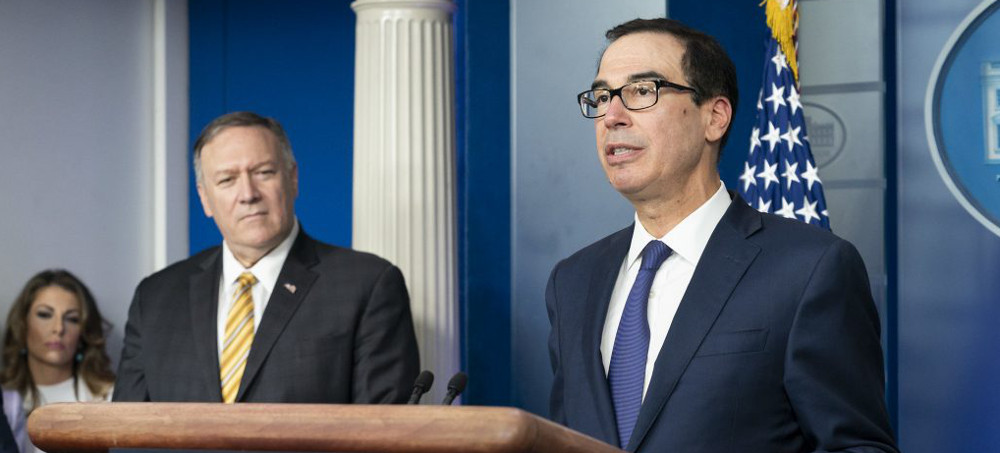 Secretary of State Mike Pompeo and Secretary of the Treasury Steven Mnuchin speak to reporters on Sept. 10, 2019, in the James S. Brady Press Briefing Room of the White House. (photo: Andrea Hanks/White House)
Secretary of State Mike Pompeo and Secretary of the Treasury Steven Mnuchin speak to reporters on Sept. 10, 2019, in the James S. Brady Press Briefing Room of the White House. (photo: Andrea Hanks/White House) Former national security adviser Michael Flynn, leaves the federal courthouse in Washington, with his lawyer, Sidney Powell. (photo: Manuel Balce Ceneta/AP)
Former national security adviser Michael Flynn, leaves the federal courthouse in Washington, with his lawyer, Sidney Powell. (photo: Manuel Balce Ceneta/AP)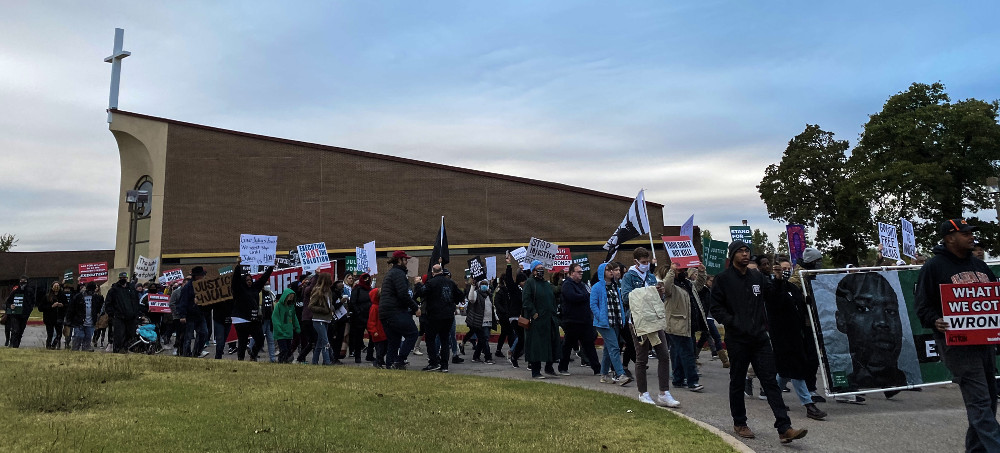 Protesters demanding justice for Julius Jones leave the Tabernacle Baptist Church in Oklahoma City on Nov. 1, 2021. (photo: Liliana Segura/The Intercept)
Protesters demanding justice for Julius Jones leave the Tabernacle Baptist Church in Oklahoma City on Nov. 1, 2021. (photo: Liliana Segura/The Intercept)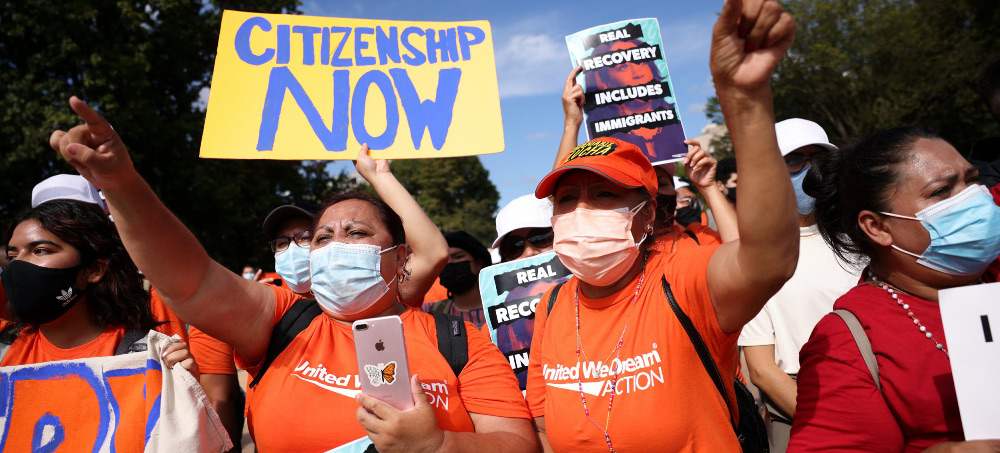 Immigration activists rally near the White House on Oct. 7 calling for immigration reform and urging President Joe Biden to authorize a pathway to citizenship for undocumented immigrants. (photo: Kevin Dietsch/Getty)
Immigration activists rally near the White House on Oct. 7 calling for immigration reform and urging President Joe Biden to authorize a pathway to citizenship for undocumented immigrants. (photo: Kevin Dietsch/Getty)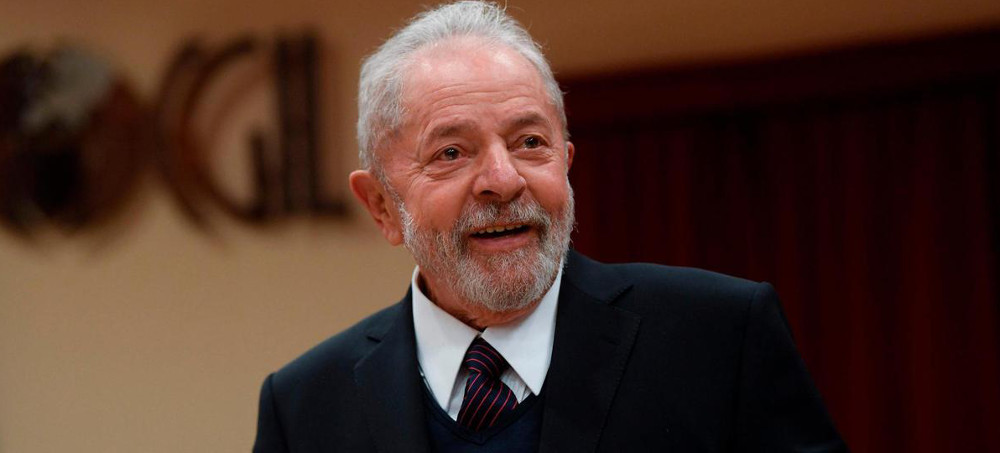 Luis Inácio Lula da Silva, president of Brazil twice from 2003 and 2010, is circulating as the favorite in all scenarios to return to the Planalto Palace in 2022. (photo: AFP)
Luis Inácio Lula da Silva, president of Brazil twice from 2003 and 2010, is circulating as the favorite in all scenarios to return to the Planalto Palace in 2022. (photo: AFP) A Chevron platform in the Gulf of Mexico on May 18, 2018. (photo: Luke Sharrett/Bloomberg)
A Chevron platform in the Gulf of Mexico on May 18, 2018. (photo: Luke Sharrett/Bloomberg)
